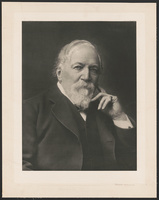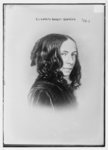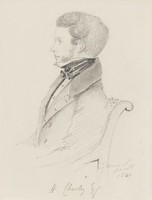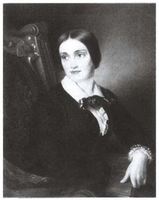Letter from Robert Browning to Elizabeth Barrett, Aug 10, 1845
Dublin Core
Title
Letter from Robert Browning to Elizabeth Barrett, Aug 10, 1845
Subject
Cushman, Charlotte Saunders, 1816-1876
Browning, Elizabeth Barrett, 1806-1861
Actors and Actresses--US American
Beauty
Description
Robert Browning mentions "Miss Cushman, the new American actress (clever and truthful-looking)" in his letter to Elizabeth Barrett.
Credit
Armstrong Browning Library - The Browning LettersCreator
Browning, Elizabeth Barrett, 1806-1861
Source
Armstrong Browning Library, The Browning Letters, Digital Collection
Date
1845-08-10
Type
Reference
Letter Item Type Metadata
Text
[page 1] Sunday Afternoon
How good you are to the smallest thing I try & do (-to show I would please you for an instant if I could, rather than from any hope such poor efforts as I am restricted to, can please you or ought.) And that you should care for the note that was not there!- But I was surprised by the summons to seal & deliver, since time & the carrier were peremptory-and so, I dared divine, almost, I should hear from you by our midday post-which happened-and the answer to that, you received on Friday Night, did you not? I had to go to Holborn, of all places,-not to pluck strawberries in the Bishop’s garden like Richard Crouchback, but to get a book-and there I carried my note, thinking to expedite its delivery: this notelet of yours, quite as little in its kind as my blue flowers,-this came last evening-and here are my thanks, dear E.B.B-dear friend. In the former note there is a phrase I must not forget to call on you to account for-that where it confesses to having done "some work-only nothing worth speaking of." Just see, And now-till tuesday good bye, and be willing to get well as* soon as can be! and may God bless you, ever dear friend. RB (letting me send porter instead of flowers-and beefsteaks too!)
[page 2] the dark"- I am inside with the lights and music: but what is done, is done, pas vrai? And "worth" is, dear my friend pardon me, not in your arbitration quite. Let me tell you an odd thing that happened at Chorley’s the other night: I must have mentioned to you that I forget my own verses so surely after they are once on paper, that I ought, without affectation, to mend them infinitely better, able as I am to bring fresh eyes to bear on them-(when I say "once on paper" that is just what I mean and no more, for after the sad revising begins they do leave their mark, distinctly or less so according to circumstances)-well, Miss Cushman, the new American actress (clever and truthful-looking) was talking of a new novel by the Dane Andersen, he of the "Improvvisatore," which shall reach us, it should seem, in translation, viâ America-she had looked over two or three proofs of the work in the press, and Chorley was anxious to know something
[page 3] about its character. The Title, she said, was capital-"Only a Fiddler!"-and she enlarged on that word, "Only," and its significance, so put: and I quite agreed with her for several minutes, till first one reminiscence flitted to me, then another and at last I was obliged to stop my praises and say "but, now I think of it. I seem to have written something with a similar title-nay, a play, I believe-yes, and in five-acts. "Only an Actress"-and from that time, some two years or more ago, to this, I have been every way relieved of it"!- And when I got home, next morning, I made a dark pocket in my russet horror of a portfolio give up its dead-and there fronted me "Only a Player-girl" (the real title) and the sayings & doings of her, and the others-such others! So I made haste and just tore out one sample-page, being Scene the First, and sent it to our friend as earnest & proof I had not been purely dreaming, as might seem to be the case- And what makes me recall it now is, that it was Russian, and about a fair on the Neva, and booths and droshkies and fish-pies and so forth, with the Palaces in the back ground: and in Chorley’s "Athenæum" of yesterday you may read a paper of very simple moony stuff about the death of Alexander, and that Sir James Wylie I have seen at St. Petersburgh (where he chose to mistake me for an Italian-"M. l’Italien" he said another time, looking up from his cards). So I think to tell you.
[page 4] Now I may leave off. I shall see you, I trust, on Tuesday-hear perhaps something definite about your travelling. Do you know, "Consuelo" wearies me-oh, wearies-and the fourth volume I have all but stopped at-there lie the three following-but who cares about Consuelo after that horrible evening with the Venetian scamp (where he bullies her, and it does answer, after all she says), as we say? And Albert wearies too-it seems all false, all writing (not the first part, though)[.] And what easy work these novelists have of it! a dramatic poet has to make you love or admire his men and women,-they must do and say all that you are to see and hear-really do it in your face, say it in your ears, and it is wholly for you, in your power, to name, characterize, and so praise or blame, what is so said and done .. if you don’t perceive of yourself, there is no standing by, for the Author, and telling you: but with these novelists, a scrape of the pen-out blurting of a phrase, and the miracle is achieved-"Consuelo possessed to perfection this and the other gift"-what would you more? Or, to leave dear George Sand, pray think of Bulwer’s beginning a "character" by informing you that Ione, or somebody in "Pompeii," "was endowed with perfect genius"-"genius"! What tho’ the obliging informer might write his fingers off before he gave the pitifullest proof that the poorest spark of that same, that genius, had ever visited him? Ione has it "perfectly"-perfectly-and that is enough! Zeus with the scales? with the false weights!
How good you are to the smallest thing I try & do (-to show I would please you for an instant if I could, rather than from any hope such poor efforts as I am restricted to, can please you or ought.) And that you should care for the note that was not there!- But I was surprised by the summons to seal & deliver, since time & the carrier were peremptory-and so, I dared divine, almost, I should hear from you by our midday post-which happened-and the answer to that, you received on Friday Night, did you not? I had to go to Holborn, of all places,-not to pluck strawberries in the Bishop’s garden like Richard Crouchback, but to get a book-and there I carried my note, thinking to expedite its delivery: this notelet of yours, quite as little in its kind as my blue flowers,-this came last evening-and here are my thanks, dear E.B.B-dear friend. In the former note there is a phrase I must not forget to call on you to account for-that where it confesses to having done "some work-only nothing worth speaking of." Just see, And now-till tuesday good bye, and be willing to get well as* soon as can be! and may God bless you, ever dear friend. RB (letting me send porter instead of flowers-and beefsteaks too!)
[page 2] the dark"- I am inside with the lights and music: but what is done, is done, pas vrai? And "worth" is, dear my friend pardon me, not in your arbitration quite. Let me tell you an odd thing that happened at Chorley’s the other night: I must have mentioned to you that I forget my own verses so surely after they are once on paper, that I ought, without affectation, to mend them infinitely better, able as I am to bring fresh eyes to bear on them-(when I say "once on paper" that is just what I mean and no more, for after the sad revising begins they do leave their mark, distinctly or less so according to circumstances)-well, Miss Cushman, the new American actress (clever and truthful-looking) was talking of a new novel by the Dane Andersen, he of the "Improvvisatore," which shall reach us, it should seem, in translation, viâ America-she had looked over two or three proofs of the work in the press, and Chorley was anxious to know something
[page 3] about its character. The Title, she said, was capital-"Only a Fiddler!"-and she enlarged on that word, "Only," and its significance, so put: and I quite agreed with her for several minutes, till first one reminiscence flitted to me, then another and at last I was obliged to stop my praises and say "but, now I think of it. I seem to have written something with a similar title-nay, a play, I believe-yes, and in five-acts. "Only an Actress"-and from that time, some two years or more ago, to this, I have been every way relieved of it"!- And when I got home, next morning, I made a dark pocket in my russet horror of a portfolio give up its dead-and there fronted me "Only a Player-girl" (the real title) and the sayings & doings of her, and the others-such others! So I made haste and just tore out one sample-page, being Scene the First, and sent it to our friend as earnest & proof I had not been purely dreaming, as might seem to be the case- And what makes me recall it now is, that it was Russian, and about a fair on the Neva, and booths and droshkies and fish-pies and so forth, with the Palaces in the back ground: and in Chorley’s "Athenæum" of yesterday you may read a paper of very simple moony stuff about the death of Alexander, and that Sir James Wylie I have seen at St. Petersburgh (where he chose to mistake me for an Italian-"M. l’Italien" he said another time, looking up from his cards). So I think to tell you.
[page 4] Now I may leave off. I shall see you, I trust, on Tuesday-hear perhaps something definite about your travelling. Do you know, "Consuelo" wearies me-oh, wearies-and the fourth volume I have all but stopped at-there lie the three following-but who cares about Consuelo after that horrible evening with the Venetian scamp (where he bullies her, and it does answer, after all she says), as we say? And Albert wearies too-it seems all false, all writing (not the first part, though)[.] And what easy work these novelists have of it! a dramatic poet has to make you love or admire his men and women,-they must do and say all that you are to see and hear-really do it in your face, say it in your ears, and it is wholly for you, in your power, to name, characterize, and so praise or blame, what is so said and done .. if you don’t perceive of yourself, there is no standing by, for the Author, and telling you: but with these novelists, a scrape of the pen-out blurting of a phrase, and the miracle is achieved-"Consuelo possessed to perfection this and the other gift"-what would you more? Or, to leave dear George Sand, pray think of Bulwer’s beginning a "character" by informing you that Ione, or somebody in "Pompeii," "was endowed with perfect genius"-"genius"! What tho’ the obliging informer might write his fingers off before he gave the pitifullest proof that the poorest spark of that same, that genius, had ever visited him? Ione has it "perfectly"-perfectly-and that is enough! Zeus with the scales? with the false weights!
From
Browning, Elizabeth Barrett, 1806-1861
To
Browning, Robert, 1812-1889
Location (Recipient)
50 Wimpole St., London, UK
Geocode Recipient (Latitude)
51.5197315
Geocode Recipient (Longitude)
-0.149073
Social Bookmarking
Collection
Citation
Browning, Elizabeth Barrett, 1806-1861, “Letter from Robert Browning to Elizabeth Barrett, Aug 10, 1845,” Archival Gossip Collection, accessed April 25, 2024, https://www.archivalgossip.com/collection/items/show/606.





